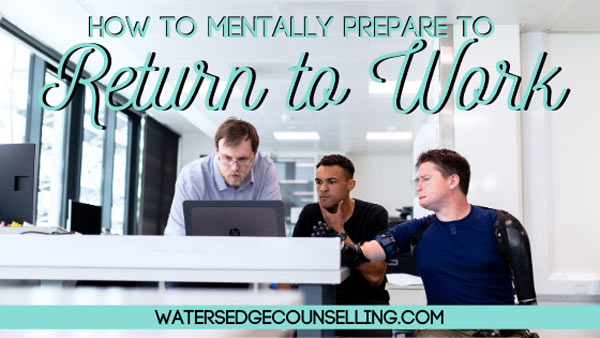
As the COVID-19 crisis spread across the country and around the globe, many people were suddenly thrown into the world of remote. Now that it’s been several months since the start of sheltering in place orders, some areas are beginning to open their communities up. This also means returning to work.
As many return to their offices, it’s expected they’ll feel stressed or mentally drained from commuting again and having more interpersonal interactions all while taking the right precautions to not get sick.
As life returns back to normal-ish, here are some useful mechanisms to help reduce the stress and mental strain that can come with returning to work after being gone for so long.
Ignore Common Stress Myths
The stress people feel at work is often a much different kind of stress than they experience at home. This means that although many have maintained the same working hours, working from home does often provides a lot of perks that can reduce usual work-related stress. For example, instead of waking up an extra hour or two early to catch the bus to work, many just wake up, get ready, and head into their home office. There is no worry about missing the bus and there’s more time to sleep in if needed.
Of course, working remotely is not without its own challenges. If someone is a parent, it’s likely that their children are also at home due to school and daycare closures. This makes the adjustment to balancing work, childcare, and eLearning responsibilities all at the same time, in the same place overwhelming and possibly detrimental to productivity. However, regardless of where you’re working from, it’s important to have the mental tools and mechanisms needed to handle these stressors in order to confront them.
The University of Southern California’s Dana and David Dornside College of Letters, Arts and Sciences has done extensive research on stress in the workplace. It found there are some common stress myths. Some of the most significant are:
-
Stress is the same for everyone.
Everyone experiences and response to work stress differently. However, developing more positive coworker relationships can reduce that stress by providing a support system to fall back on when dealing with challenges at work.
-
Stress is everywhere, so you can’t do anything about it.
Due to the nature of the workplace these days, it sometimes feels as if people can’t work fast or hard enough. In such a fast-paced culture, it can be hard recognizing when work becomes too much. To help reduce this overwhelming stress, try breaking down tasks and working on the simple problems first
-
Only major symptoms should be addressed.
Stress is stress, no matter how big or how little. However, people tend to pay more attention to the big stressors, when actually it is equally important to deal with the small work stressors as those can build up quickly and lead to a lot of negative feelings and even be detrimental to your work.
As offices open back up, it’s essential to prepare for these different, yet familiar stresses to make the transition back a bit easier.
Awareness is Key
What is mindfulness? It’s a popular buzzword that pops up a lot in headlines, but it’s also a key component in reducing anxiety and managing stress in the workplace. According to Invigor Medical, “Mindfulness involves focusing on what you’re experiencing, thinking, and feeling in the present moment. It’s easy to get hung up on the past or fret about the future. Try your best to practice mindfulness and pay attention to what’s currently going on around you.”
Mindfulness can go a long way in helping to cope with the transition back to regular work life. Returning to work with new eyes has its perks. As recommended above, during the first days or even weeks back, try being more aware and recognizing any increase in stress or anxiety and start approaching it more intentionally.
Those at Mindful also recommend having a growth mindset when incorporating the practice into work. This can not only help to improve overall mental health but allow for better mental resilience when it comes to change and challenges — which is to be expected during a crisis such as COVID-19. Don’t let the negative effects of stress get out of control. Instead, take control of those feelings by identifying the causes and then working to reduce them rather than ignoring it until later. With more mindfulness, the transition back to work doesn’t have to be a complete nightmare.
The world has certainly been thrown a curveball with the recent COVID-19 pandemic. Many aspects of society and people’s everyday lives were drastically changed, seemingly, overnight. With so many people working remotely the past several months, the thought of returning to the office might inspire feelings of dread and anxiety.
Now, as life begins taking the baby steps back to ways things were, it’s time to start mentally preparing for the return to work. While work is always bound to be stressful at times, having the right tools and coping methods can at least make that stress a bit easier to deal with as communities open up once again.
Leave a Reply